Samantha Combs's Blog, page 8
April 14, 2013
What Makes a Hero a Hero?
I have been fortunate enough to be partnered with a new publishing company for my latest release, THE DEADLIES, and my new association with them, Sweet Cravings Publishing, AKA Secret Cravings Publishing, has brought in a world of new authors to meet, read, and enjoy. Today on the bloggy, I am featuring one such author and new friend, Tamara Hoffa.
An editor at SCP, Tamara is a mom, wife, hairstylist and a reviewer at Sizzling Hot Book Reviews. And now she is a new author as well. I am happy to introduce you to Tam and her new book, ROPING LOVE, with her idea of a hero. Thanks for being here, Tam!
What Makes a Hero a Hero?....by author Tamara Hoff

It seems that there are certain professions that dominate the romance genre as heroes: Military men, Police Officers, Firefighters, Cowboys. Does being in one of these professions make a man a hero?
To a certain extent I think it does. It’s not the profession itself that makes these men heroes. It the type of man who chooses to become one of the few and the proud that makes him a hero!
Men who put their lives on the line for the safety and freedom of others. Men of honor and pride. Men who put aside thought of their own health and safety for the good of their country or community.
I love this type of hero. And I must admit, that thus far all of MY book hero’s fall into this category. Jameson Hunter, From Heart of a Soldier is an Army CPO. Chance Ryan, from my upcoming release Roping Love is a cowboy. And the heroes of both my WIP’s A Special Kind of Love and Windy City Dragons are both firefighters.
But, to me, the most important aspects of being a hero are on the inside. I want a hero who is compassionate. Who loves his partner with everything in his heart. I want him to show me that he is willing to do anything for his heroine, even if that means giving her up.
Blurb:
Ten Years ago love slipped through Chance’s lasso. This time “He was going after her and she didn’t stand a chance, just like a calf in a chute, he was going to rope her with his love and ride back into her life.”
Carrie Stewart is a dedicated horsewoman. She runs a successful breeding and training program. She is a good friend, a good sister and a favorite aunt, but she has been burned by love. Carrie has never gotten over her first love, Chance Ryan. After ten years of absence Chance shows back up in her life. Should she risk her heart again, with the man who left it broken at her feet in the past? Chance has some serious work ahead of him to win back the one woman he could never forget.
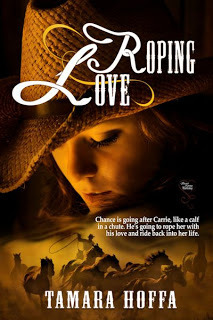
Excerpt from Roping Love
Chance felt like he’d been thrown from a bucking bronco. Ten years. He hadn’t seen her in ten years. And it was just like before. God, she was even more beautiful than she had been at eighteen. Time had matured her body, her curves a little fuller than they had been. Her hair was short now, almost boyish in length, but curling softly around her face it looked feminine and flirty. It was a deeper shade of blonde now too, a golden honey color that looked stunning against her sun-bronzed skin. What the hell was she doing here? And who the hell was the kid with her? Chance was busy doing mental math, the kid looked nine or ten. Carrie had called him several times in the months after he left. He’d never returned her calls. Could she have been trying to tell him she was pregnant? No it couldn’t be, she would have told him. Wouldn’t she have?
“I’d say small world, but since it really is a small world and we haven’t run into each other in ten years…”
Carrie arched one eyebrow, he always loved when she did that, it looked so haughty and hot.
“What brings you here?” Chance asked
“Same as you I guess, looking for some brood mares.”
“Actually, we’re selling this mare.” Nodding at the other, nearly forgotten man in the stall. “This is my brother, Chase.”
“Nice to meet you,” Carrie said, looking down at Tyler, “Well, we need to get to the Coliseum, Tyler wants to see the cutting.” Keeping her arm around his shoulders they turned to leave.
“We should talk,” Chance said
Carrie looked over her shoulder and stared him straight in the eye. “I think the time for talking is long past.”
The phrase she was so mad she could chew nails and spit screws ran though his mind at her look. Damn. He had really fucked things up between them. Why hadn’t he taken her calls again?
Oh, yeah, to give her a chance at a good life.
Chance had a very difficult decision to make. He was only twenty years old and Carrie was only eighteen. His father had passed away and he was left to take over as head of his family, running a failing ranch and raising his two younger brothers.
Should he have given Carrie the option to join him in his struggles? Maybe. But, he chose to let he go in the hopes she would find a happier life with someone else. Even though it broke his heart.
That is true love!
A hero can have any job, from dishwasher or ditch digger, to Millionaire entrepreneur or software geek. As long as he has those intrinsic qualities that make him special. My own personal hero has held many jobs. He owned a swimming pool maintenance company (yes I got the pool man!). He installed satellite television systems and now he works at a financial lending institute. But he is a true hero. We have been married over thirty years, and he has stuck with me through thick and thin (and believe me, there’s been a lot of thin). He supported me through many difficult undertakings.
We raised three children, one of whom is a special needs child. And he has been my biggest supporter in my fledgling writing career. He is a big man, with a big heart and a great sense of humor. I think there a little piece of him in all my heroes.
So tell me, what makes a man a hero to you? Who is the hero in your life?
Thanks so much for having me here today Samantha!
Thanks for being here, Tam. And if you enjoyed this post as much as me, let her know. All indie authors love to hear from their readers. Get connected!
BIO:
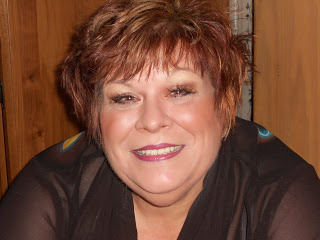 Tamara Hoffa lives in central Tennessee, with her husband of 30 years, her three grown children, two grandchildren, 5 dogs and 1 cat. Tamara started reading when she was four years old and has rarely been seen without a book at hand since. At home you will usually find her in “nana’s chair” with her kindle, her laptop or one of her precious, precocious grandson’s in her lap. Tamara is a reviewer, a professional reader and can now add author to her repertoire. Tamara is proof positive that it’s never too late to reach for your dreams.
Tamara Hoffa lives in central Tennessee, with her husband of 30 years, her three grown children, two grandchildren, 5 dogs and 1 cat. Tamara started reading when she was four years old and has rarely been seen without a book at hand since. At home you will usually find her in “nana’s chair” with her kindle, her laptop or one of her precious, precocious grandson’s in her lap. Tamara is a reviewer, a professional reader and can now add author to her repertoire. Tamara is proof positive that it’s never too late to reach for your dreams.
Contact Links:
Facebook : https://www.facebook.com/AuthorTamara...
Twitter: https://www.twitter.com/TamaraHoffa
Goodreads: http://www.goodreads.com/author/show/....
Tamara_Hoffa Blog: http://sslyblog.wordpress.com/
An editor at SCP, Tamara is a mom, wife, hairstylist and a reviewer at Sizzling Hot Book Reviews. And now she is a new author as well. I am happy to introduce you to Tam and her new book, ROPING LOVE, with her idea of a hero. Thanks for being here, Tam!
What Makes a Hero a Hero?....by author Tamara Hoff

It seems that there are certain professions that dominate the romance genre as heroes: Military men, Police Officers, Firefighters, Cowboys. Does being in one of these professions make a man a hero?
To a certain extent I think it does. It’s not the profession itself that makes these men heroes. It the type of man who chooses to become one of the few and the proud that makes him a hero!
Men who put their lives on the line for the safety and freedom of others. Men of honor and pride. Men who put aside thought of their own health and safety for the good of their country or community.
I love this type of hero. And I must admit, that thus far all of MY book hero’s fall into this category. Jameson Hunter, From Heart of a Soldier is an Army CPO. Chance Ryan, from my upcoming release Roping Love is a cowboy. And the heroes of both my WIP’s A Special Kind of Love and Windy City Dragons are both firefighters.
But, to me, the most important aspects of being a hero are on the inside. I want a hero who is compassionate. Who loves his partner with everything in his heart. I want him to show me that he is willing to do anything for his heroine, even if that means giving her up.
Blurb:
Ten Years ago love slipped through Chance’s lasso. This time “He was going after her and she didn’t stand a chance, just like a calf in a chute, he was going to rope her with his love and ride back into her life.”
Carrie Stewart is a dedicated horsewoman. She runs a successful breeding and training program. She is a good friend, a good sister and a favorite aunt, but she has been burned by love. Carrie has never gotten over her first love, Chance Ryan. After ten years of absence Chance shows back up in her life. Should she risk her heart again, with the man who left it broken at her feet in the past? Chance has some serious work ahead of him to win back the one woman he could never forget.

Excerpt from Roping Love
Chance felt like he’d been thrown from a bucking bronco. Ten years. He hadn’t seen her in ten years. And it was just like before. God, she was even more beautiful than she had been at eighteen. Time had matured her body, her curves a little fuller than they had been. Her hair was short now, almost boyish in length, but curling softly around her face it looked feminine and flirty. It was a deeper shade of blonde now too, a golden honey color that looked stunning against her sun-bronzed skin. What the hell was she doing here? And who the hell was the kid with her? Chance was busy doing mental math, the kid looked nine or ten. Carrie had called him several times in the months after he left. He’d never returned her calls. Could she have been trying to tell him she was pregnant? No it couldn’t be, she would have told him. Wouldn’t she have?
“I’d say small world, but since it really is a small world and we haven’t run into each other in ten years…”
Carrie arched one eyebrow, he always loved when she did that, it looked so haughty and hot.
“What brings you here?” Chance asked
“Same as you I guess, looking for some brood mares.”
“Actually, we’re selling this mare.” Nodding at the other, nearly forgotten man in the stall. “This is my brother, Chase.”
“Nice to meet you,” Carrie said, looking down at Tyler, “Well, we need to get to the Coliseum, Tyler wants to see the cutting.” Keeping her arm around his shoulders they turned to leave.
“We should talk,” Chance said
Carrie looked over her shoulder and stared him straight in the eye. “I think the time for talking is long past.”
The phrase she was so mad she could chew nails and spit screws ran though his mind at her look. Damn. He had really fucked things up between them. Why hadn’t he taken her calls again?
Oh, yeah, to give her a chance at a good life.
Chance had a very difficult decision to make. He was only twenty years old and Carrie was only eighteen. His father had passed away and he was left to take over as head of his family, running a failing ranch and raising his two younger brothers.
Should he have given Carrie the option to join him in his struggles? Maybe. But, he chose to let he go in the hopes she would find a happier life with someone else. Even though it broke his heart.
That is true love!
A hero can have any job, from dishwasher or ditch digger, to Millionaire entrepreneur or software geek. As long as he has those intrinsic qualities that make him special. My own personal hero has held many jobs. He owned a swimming pool maintenance company (yes I got the pool man!). He installed satellite television systems and now he works at a financial lending institute. But he is a true hero. We have been married over thirty years, and he has stuck with me through thick and thin (and believe me, there’s been a lot of thin). He supported me through many difficult undertakings.
We raised three children, one of whom is a special needs child. And he has been my biggest supporter in my fledgling writing career. He is a big man, with a big heart and a great sense of humor. I think there a little piece of him in all my heroes.
So tell me, what makes a man a hero to you? Who is the hero in your life?
Thanks so much for having me here today Samantha!
Thanks for being here, Tam. And if you enjoyed this post as much as me, let her know. All indie authors love to hear from their readers. Get connected!
BIO:
 Tamara Hoffa lives in central Tennessee, with her husband of 30 years, her three grown children, two grandchildren, 5 dogs and 1 cat. Tamara started reading when she was four years old and has rarely been seen without a book at hand since. At home you will usually find her in “nana’s chair” with her kindle, her laptop or one of her precious, precocious grandson’s in her lap. Tamara is a reviewer, a professional reader and can now add author to her repertoire. Tamara is proof positive that it’s never too late to reach for your dreams.
Tamara Hoffa lives in central Tennessee, with her husband of 30 years, her three grown children, two grandchildren, 5 dogs and 1 cat. Tamara started reading when she was four years old and has rarely been seen without a book at hand since. At home you will usually find her in “nana’s chair” with her kindle, her laptop or one of her precious, precocious grandson’s in her lap. Tamara is a reviewer, a professional reader and can now add author to her repertoire. Tamara is proof positive that it’s never too late to reach for your dreams.Contact Links:
Facebook : https://www.facebook.com/AuthorTamara...
Twitter: https://www.twitter.com/TamaraHoffa
Goodreads: http://www.goodreads.com/author/show/....
Tamara_Hoffa Blog: http://sslyblog.wordpress.com/
Published on April 14, 2013 12:49
March 26, 2013
Cover Reveal: THE DEADLIES
A week from today, my new publisher, Secret Cravings Publishing, will be releasing my next novel, The Deadlies. Here is the blurb:
When Calliope Flood catches the unwanted attention of prettiest and most privileged girls at her new school, she learns they are possessed of more than just good ole’ Southern charm; they are also possessed by the demons of the Seven Deadly Sins.
Whether she likes it or not, the Ravens want the pretty new girl to become one of their members. Their club is so secret, only a select few know their truth. As a budding journalist, Callie is more interested in investigating them than joining them. When people begin to disappear, she soon discovers the Ravens aren’t just interested in her for her looks; slowly, she learns she’s a legacy. Calliope enlists her eccentric Aunt, her new friends, and a quietly disarming Southern boy to form their own group, The Virtues, to free the girls, and the town, from the demons that have taken over their lives.
And now, my new cover:
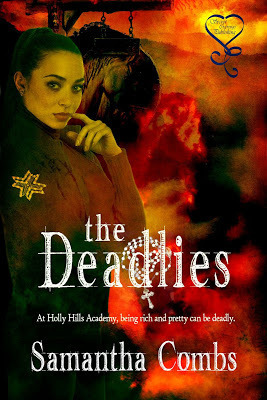
Releasing April 2, 2013, from Secret Cravings Publishing. http://store.secretcravingspublishing...
When Calliope Flood catches the unwanted attention of prettiest and most privileged girls at her new school, she learns they are possessed of more than just good ole’ Southern charm; they are also possessed by the demons of the Seven Deadly Sins.
Whether she likes it or not, the Ravens want the pretty new girl to become one of their members. Their club is so secret, only a select few know their truth. As a budding journalist, Callie is more interested in investigating them than joining them. When people begin to disappear, she soon discovers the Ravens aren’t just interested in her for her looks; slowly, she learns she’s a legacy. Calliope enlists her eccentric Aunt, her new friends, and a quietly disarming Southern boy to form their own group, The Virtues, to free the girls, and the town, from the demons that have taken over their lives.
And now, my new cover:

Releasing April 2, 2013, from Secret Cravings Publishing. http://store.secretcravingspublishing...
Published on March 26, 2013 22:51
March 13, 2013
Who Is On Your Personal Board of Directors?
I was lucky to be invited to a charity function a couple of weeks back in Beverly Hills. It was everything the mere location might suggest to you, with perfectly put-together people, tons of beautiful things I can ill afford but drooled over just the same (serpent gold ring, I am talking to you!), and the prerequisite luxury vehicles crowding the valet area as my underwhelming family minivan was brought around. But, there was one shining exception: the guest speaker.
I did not expect to be as moved as I was. Charities are amazing, awesome things and it's easy to be swept up in the humanitarianism of it, yet, somehow miss the grand message. Thank goodness I didn't. The speaker brought the room to life with two simple messages about life and living it. The first is this: You are enough.
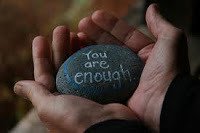
The stark simplicity of this stunned me. She told the room that we did not need to gain weight or lose weight or change our hair color or get a better job or different job or any of those things because whatever we were, right at that moment, was enough. It was an illuminating moment. I thought about all the books I had written and where I thought I wanted to be versus where I actually am, and I decided, right then and there, I was satisfied. Writing and being published was enough. Sharing my work the way I do, it's enough. The thought washed over me like calm, warm water and I knew she was right. I am enough.
Her second message was even more profound to me. She asked us to think of our lives as businesses. With departments. Like the Billing and Accounting Department, the Fashion and Style Department, the Family and Kids Department, the Important Decisions Department. And she asked us to envision the people in our lives that are important to us, the ones that help us make the critical changes our lives need or that convince us the perfection of staying right where we are. She asked us to think about our own Board of Directors. So I did. I realized everyone has a purpose, a position, even a "title". Even some of the sincerely killer people I have met on Facebook.
So, I challenge you to do the same thing. We are all in this writing process together. Are you writing to some goal and dissatisfied with where you are because you aren't there yet? Or is what you have done, right now, today, enough? And how about your personal Board of Directors. Can you name them? Do you know their titles? Do they know how important they are to you? Today might be a great day to tell them. Better yet, put them in the acknowledgements section of your next book. I know I will. And it is.....enough.
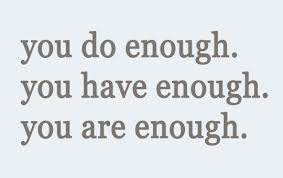
I did not expect to be as moved as I was. Charities are amazing, awesome things and it's easy to be swept up in the humanitarianism of it, yet, somehow miss the grand message. Thank goodness I didn't. The speaker brought the room to life with two simple messages about life and living it. The first is this: You are enough.

The stark simplicity of this stunned me. She told the room that we did not need to gain weight or lose weight or change our hair color or get a better job or different job or any of those things because whatever we were, right at that moment, was enough. It was an illuminating moment. I thought about all the books I had written and where I thought I wanted to be versus where I actually am, and I decided, right then and there, I was satisfied. Writing and being published was enough. Sharing my work the way I do, it's enough. The thought washed over me like calm, warm water and I knew she was right. I am enough.
Her second message was even more profound to me. She asked us to think of our lives as businesses. With departments. Like the Billing and Accounting Department, the Fashion and Style Department, the Family and Kids Department, the Important Decisions Department. And she asked us to envision the people in our lives that are important to us, the ones that help us make the critical changes our lives need or that convince us the perfection of staying right where we are. She asked us to think about our own Board of Directors. So I did. I realized everyone has a purpose, a position, even a "title". Even some of the sincerely killer people I have met on Facebook.
So, I challenge you to do the same thing. We are all in this writing process together. Are you writing to some goal and dissatisfied with where you are because you aren't there yet? Or is what you have done, right now, today, enough? And how about your personal Board of Directors. Can you name them? Do you know their titles? Do they know how important they are to you? Today might be a great day to tell them. Better yet, put them in the acknowledgements section of your next book. I know I will. And it is.....enough.

Published on March 13, 2013 22:06
March 4, 2013
How Do You Make "Taboo", not be "Too Hot?"
My new friend Kelly Martin is an exciting new author recently inducted into the Astraea Press family. With two thought-provoking young adult novels under her belt, Kelly is no stranger to writing about taboo subjects. In fact, she kind of specializes in them, doing them the kind of justice only an insightful, fully-plugged in author can do. I am in awe. I'm grateful she agreed to talk about writing hot topics on the bloggy, the same week of her new release. Please welcome the intensely personal Kelly Martin.
Tackling Taboo Subjects in writing......by the author Kelly Martin
I’ll be the first to admit, I’m a bit of a prudish person (does that sound bad?) The only ‘bad’ thing I do is occasionally cuss (not out loud or around people), and that’s it.
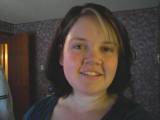 But I’m also a writer… and my characters aren’t like me.
But I’m also a writer… and my characters aren’t like me. So, that begs the question: how does one tackle taboo subjects in writing… especially when the writer isn’t accustomed to saying/doing it themselves?
In my first book, CROSSING THE DEEP, I had to deal with the subject of the boyfriend of a family member attempting to molest my main male character. It happened in a bit of flashback form, but still… it was really difficult to write. I ended up implying what happened, satisfied it was enough, and sent it out into the world.
A publisher became interested in the novel and asked if I would elaborate on the molestation because she felt it was needed but hard for me to write (she knew me so well). So, I did. It was difficult, but in the end, it really served the book well.
My second novel, SAINT SLOAN, was very difficult to write for me because it deals with sex and a very violent attempted rape of the main character. I was freaked out to write it to say the least… I mean, my mama was going to read it!
Even until it’s release day (last week), I freaked out over it. Would it be too much? Too graphic? Would audiences turn away? Would it go over well? Etc… So far, it’s been positive. Even my mother loved the book (and swears up and down it’s not because I wrote it ;) )
Will I have more ‘taboo’ subjects in my novels? Probably… and probably some more ‘taboo’ or ‘controversial’ than I have already written. Why? Because life isn’t always sunshine and roses. If a character is going through something, it needs to be on the page. Do you have to put every hit, every thrust, every drug taken, every spell cast? No. But it needs to be enough to keep your readers in the story.
You can write ‘clean’ fiction about taboo or controversial subjects. Be honest. Be respectful. Watch your language. And above all, be true to your story. Don’t put a sex scene in just ‘because’. Make it relevant to your story and true to your characters. Readers are smart… they know when you are trying to get one over on them.
Do you have any thoughts on tackling ‘taboo’ subjects? What have you had to write about that you weren’t particularly thrilled about for a story to work?
My thanks to Samantha for having me on her blog today! I appreciate it so much!
~Kelly Martin
Kelly Martin is a southern girl who lives with her husband and three rowdy, angelic daughters. By day, she is a teacher. By night, she is a crazy-haired, multi-tasker who writes when the kids go to bed.
She has two young adult novels out now: SAINT SLOAN (about a girl who can’t get away from her past) and CROSSING THE DEEP (a girl’s faith is tested, stranding on a mountain with a guy she barely knows). Both are Amazon bestsellers.
You can find her at any of her two blogs: www.kellymartinstories.com (author blog) and www.encourage365.com (daily devotional blog).
Kelly loves God, is addicted to chocolate, and would rather write than sleep.
BUY LINKS:
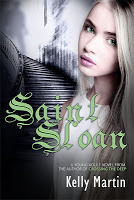
SAINT SLOAN:AMAZON: http://www.amazon.com/Saint-Sloan-ebook/dp/B00BMQ9E9O/ref=sr_1_1?s=digital-text&ie=UTF8&qid=1362322637&sr=1-1&keywords=saint+sloan
BARNES AND NOBLE: http://www.barnesandnoble.com/w/saint-sloan-kelly-martin/1114723748?ean=2940016377308
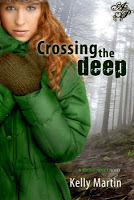
CROSSING THE DEEP: AMAZON: http://www.amazon.com/Crossing-The-Deep-ebook/dp/B009NWGMMQ/ref=pd_rhf_se_p_t_1
BARNES AND NOBLE: http://www.barnesandnoble.com/w/crossing-the-deep-kelly-martin/1113215706?ean=2940015565096
Published on March 04, 2013 05:00
February 20, 2013
Is a Social-Network Presence Important to Agents?
I follow a WONDERFUL blog called The Daily Dahlia (www.dailydahlia.wordpress.com) and she always has appropriate and timely information for new, aspiring and even established authors. Since my blog caters to the informational, I had to grab a few bits of her latest. She interviewed agents with specific questions and got some interesting answers. I want to share the highlights and this first post is regarding social networking.
Many indies I know lament whether spending time on the social networking sites like Facebook, Twitter, LinkedIn, Goodreads, etc., is worth the effort and does anything for their writing. I was thrilled to find this a posed question and am sharing it here:
Is an author’s Social Media platform and experience important to you at all? If you advise authors to be more active in Social Media, what do you think are the most important tools/sites to use? What do you think it’s important not to do?***Things like Twitter and being part of an online community are great for many reasons, but if a writer isn’t online, it won’t sway my opinion about their book. Social media presence is something that can be built later, and even then only if it seems necessary. Non-fiction writers are different. They need a presence first, and it matters a lot. But with fiction? All I need is a really good novel.*Once we have a book deal, I think it is important that all writers, at minimum, have a website and probably a professional/author facebook page. But I think it is important for writers in certain genres (like kidlit) to be a little more active on social media. Most of my (kidlit) clients tweet, some of them blog, and I do think those things can help them sell books (and get people to signings and other author events).As for what not to do: don’t air any dirty laundry on social media– if I find a writer complaining about other agents rejecting them or, really, ranting about anything I’m less likely to want to work with them. (And, obviously: ditto finding anything sexist, homophobic, racist, or generally crazy etc.) And writers should always remember they are in a very public space: unless you are actually writing about these things I’d stay away from discussing divisive topics like religion or politics. The idea behind a writer using social media is to get a bunch of people from all kinds of different places and backgrounds to like you and want you to succeed, so make sure that, at all times, you are presenting your very best, most likable face!*Yes. Websites are crucial. Twitter and facebook too. Do NOT bad mouth people or behave badly. Stay civil, especially politically.*It’s important, definitely a plus when I’m considering signing someone. I do recommend authors get themselves out there, especially since so much book shopping is done online these days. I’m not entirely convinced that you need to use a specific site. There always seems to be a new one. I think the quality of interaction with readers or friends is the most important bit. If you don’t know how to use, say, Pinterest, and never have anything to say then what good is that? Better to find one you are comfortable with. That said, I try to get my authors on Goodreads, Twitter and Facebook.As for what not to do: remember to be professional. Anyone can read what you say, including potential editors, agents and readers. Maybe you don’t have many followers NOW, but pretend you have already reached the level of success you aspire to whenever you hit that “post” button. Get separate private and personal accounts. That way your elderly relatives won’t share naked baby pictures with your agent, and you will have a place to kvetch about how long and difficult the querying and submission processes are without risking offending someone. Don’t be too negative, it can be a turn off. If that feels too restrictive, remember that things you LOVE, especially books but also TV, movies and other media is a great place to start meeting like-minded folks.*It’s useful to know about if it’s huge, but it’s not as important as the book, especially in fiction. I’d advise an author to be active on dedicated accounts on Twitter and Facebook, and blogging can be helpful as well. But only to the extent that the author is comfortable with it. You use social media to build word-of-mouth, so if you’re not happy and forging meaningful connections, it’s not worth the time and effort. You could be writing instead!*It’s not that important for fiction, but I’m definitely impressed by authors who have an active, professional social media presence. An unprofessional presence (think overly negative posts, poor spelling and grammar) is worse than none at all.*Social media is important but in the case of fiction, no MORE important than writing a great book. And when I am choosing a new fiction author, the author’s social media prowess doesn’t factor into the decision much at all. Non-fiction authors are a whole other kettle of fish. I do check an author’s social media before I offer rep and that is largely to spot any red flags…like are they grossly inappropriate on their blogs, are they unprofessional in their public persona? I don’t claim to be a social media expert so I advise authors that they should explore finding the social media venues that work best for them but I don’t make mandates or give specific instructions. Personally, I am a big Twitter fan and I don’t love Facebook for my own use, but lots of folks feel the opposite way. Blogging can be done effectively or really ineffectively, especially if it feels like the author would rather have her teeth pulled than write a blog post. It shows and who wants to read that? Authors need to get that social media should be social and informative and fun. It isn’t really about just screeching BUY MY BOOK over and over and over again to the exclusion of any other interaction. No one wants to listen to that.*It’s nice if they have a cool social media platform… but I’d much rather have somebody with a truly phenomenal book and NO social media savvy. If it’s a choice between “getting more twitter followers” or “learning to be a better writer” — I’d opt for the latter.*Twitter is a popular Social Media site for authors and for agents. It’s probably of greater value for building a following than Facebook. Of course, in five or ten years these two sites may be obviated by some shiny new Social Media site. For now, however, Twitter has a certain utility for authors, because it is a social media site built around connection by mutual interest, rather than my mutual acquaintance. That is to say, you choose people to follow on Twitter because you’re interested in what they have to tweet about and not necessarily because you know them, whereas Facebook requires that each user acknowledge and approve a shared connection in order for each to view the others’ posts. Twitter makes it easier for people to discover you, because privacy on Twitter is not as much an issue as it is with Facebook. There are, however a panoply of social media, social blogging, and aggregation sites, (some devoted specifically to books and reading) one can find a niche in (Tumblr, Reddit, Goodreads, etc.). I think the most important thing is to try everything at least once (except maybe 4Chan, you might want to leave that site alone) and to be familiar with the different types of social media sites available. If you don’t feel like you’re hip to what’s happening on the interwebs, then consider reading or subscribing to a few tech blogs or online magazines that comment on internet phenomena (Wired, Boing-Boing, Gizmodo etc.)You’ve probably already heard this before, but don’t be a spammer and don’t be a creep. You can’t browbeat people into liking your work through repetition or stalking. On Twitter, don’t “buy” followers. Really, on any social media site, don’t try shortcuts that will make you seem more important that you are in an effort to win a genuine following. The purpose of social media is not to sell things to unwitting consumers, but to make genuine connections with other people. If by dint of those connections you manage to encourage some sort of commercial transaction to occur outside of that connection, then that’s gravy, but it’s not the point. The point is to promote yourself by being likable, by being interesting, and by being engaging, and you can’t hope to do that if you’re constantly talking about things that are important exclusively to you. On the flip-side of that, don’t be timid about self-promotion. Don’t be afraid to engage people on social media. Send out invites, welcome new followers, start conversations with people you don’t know. When you begin to feel comfortable that you know the people who follow you and where their level of interest in you lies, a bit shameless self-promotion is sometimes warranted. Don’t be afraid to ask your followers to help promote you to their friends and followers. So long as it’s not the only thing you write about, it should be fine. Anyone who doesn’t want to help you won’t, but a few will, and that’s how you increase your following. Also, don’t be boring. Don’t post about being hungry, or sleepy, or about anything that you don’t think would be entertaining for someone else.*I do think it is important but great writing will always win me over in the end. I think it is important for authors to enjoy social media. So picking a platform that they feel comfortable on and enjoy engaging with is the most important thing. I also say spend 10% of time marketing 90% being a real person.*Depends on what you mean by “important.” Will 300k Twitter followers make me want to sign a book I wouldn’t regularly represent? No. Will a complete lack of social media presence make me not want to sign a book I normally would? No. I would love if a book I loved also came with a writer with 300k Twitter followers, but it’s no requirement. I do think writers should do social media, but only to connect with people. There is also no one way to do social media. You don’t have to do Twitter, Facebook, Goodreads, and your own blog all at once; try them out and pick which work for you.The number one thing you don’t want to do is go in intending to use it to sell your book. You want to know how many people who pitched me on social media got a request from me for pages? None. How many have I chatted casually to and later asked about and read their work? About a dozen.Number two thing: Don’t be a total jackass. Acerbic is fine; we aren’t all puppies and rainbows. But there is a line. Recently an author was dropped by his publisher for tweeting a racist and sexist comment at someone who made a homophobic comment. If he had tweeted something like “You are a terrible human being” instead, he’d have gotten his point across without being a total jackass and losing his publisher.On a related note, don’t forget the value of in-person socializing. Going to conferences can be nice for meeting editors and agents, sure, but you also meet other writers, make friends, and build relationships. And, if you’re like Victoria Schwab, you can even hug Neil Gaiman. Essentially, your focus should be on meeting awesome people who love books, both online and off. Good things will follow.***
Many indies I know lament whether spending time on the social networking sites like Facebook, Twitter, LinkedIn, Goodreads, etc., is worth the effort and does anything for their writing. I was thrilled to find this a posed question and am sharing it here:
Is an author’s Social Media platform and experience important to you at all? If you advise authors to be more active in Social Media, what do you think are the most important tools/sites to use? What do you think it’s important not to do?***Things like Twitter and being part of an online community are great for many reasons, but if a writer isn’t online, it won’t sway my opinion about their book. Social media presence is something that can be built later, and even then only if it seems necessary. Non-fiction writers are different. They need a presence first, and it matters a lot. But with fiction? All I need is a really good novel.*Once we have a book deal, I think it is important that all writers, at minimum, have a website and probably a professional/author facebook page. But I think it is important for writers in certain genres (like kidlit) to be a little more active on social media. Most of my (kidlit) clients tweet, some of them blog, and I do think those things can help them sell books (and get people to signings and other author events).As for what not to do: don’t air any dirty laundry on social media– if I find a writer complaining about other agents rejecting them or, really, ranting about anything I’m less likely to want to work with them. (And, obviously: ditto finding anything sexist, homophobic, racist, or generally crazy etc.) And writers should always remember they are in a very public space: unless you are actually writing about these things I’d stay away from discussing divisive topics like religion or politics. The idea behind a writer using social media is to get a bunch of people from all kinds of different places and backgrounds to like you and want you to succeed, so make sure that, at all times, you are presenting your very best, most likable face!*Yes. Websites are crucial. Twitter and facebook too. Do NOT bad mouth people or behave badly. Stay civil, especially politically.*It’s important, definitely a plus when I’m considering signing someone. I do recommend authors get themselves out there, especially since so much book shopping is done online these days. I’m not entirely convinced that you need to use a specific site. There always seems to be a new one. I think the quality of interaction with readers or friends is the most important bit. If you don’t know how to use, say, Pinterest, and never have anything to say then what good is that? Better to find one you are comfortable with. That said, I try to get my authors on Goodreads, Twitter and Facebook.As for what not to do: remember to be professional. Anyone can read what you say, including potential editors, agents and readers. Maybe you don’t have many followers NOW, but pretend you have already reached the level of success you aspire to whenever you hit that “post” button. Get separate private and personal accounts. That way your elderly relatives won’t share naked baby pictures with your agent, and you will have a place to kvetch about how long and difficult the querying and submission processes are without risking offending someone. Don’t be too negative, it can be a turn off. If that feels too restrictive, remember that things you LOVE, especially books but also TV, movies and other media is a great place to start meeting like-minded folks.*It’s useful to know about if it’s huge, but it’s not as important as the book, especially in fiction. I’d advise an author to be active on dedicated accounts on Twitter and Facebook, and blogging can be helpful as well. But only to the extent that the author is comfortable with it. You use social media to build word-of-mouth, so if you’re not happy and forging meaningful connections, it’s not worth the time and effort. You could be writing instead!*It’s not that important for fiction, but I’m definitely impressed by authors who have an active, professional social media presence. An unprofessional presence (think overly negative posts, poor spelling and grammar) is worse than none at all.*Social media is important but in the case of fiction, no MORE important than writing a great book. And when I am choosing a new fiction author, the author’s social media prowess doesn’t factor into the decision much at all. Non-fiction authors are a whole other kettle of fish. I do check an author’s social media before I offer rep and that is largely to spot any red flags…like are they grossly inappropriate on their blogs, are they unprofessional in their public persona? I don’t claim to be a social media expert so I advise authors that they should explore finding the social media venues that work best for them but I don’t make mandates or give specific instructions. Personally, I am a big Twitter fan and I don’t love Facebook for my own use, but lots of folks feel the opposite way. Blogging can be done effectively or really ineffectively, especially if it feels like the author would rather have her teeth pulled than write a blog post. It shows and who wants to read that? Authors need to get that social media should be social and informative and fun. It isn’t really about just screeching BUY MY BOOK over and over and over again to the exclusion of any other interaction. No one wants to listen to that.*It’s nice if they have a cool social media platform… but I’d much rather have somebody with a truly phenomenal book and NO social media savvy. If it’s a choice between “getting more twitter followers” or “learning to be a better writer” — I’d opt for the latter.*Twitter is a popular Social Media site for authors and for agents. It’s probably of greater value for building a following than Facebook. Of course, in five or ten years these two sites may be obviated by some shiny new Social Media site. For now, however, Twitter has a certain utility for authors, because it is a social media site built around connection by mutual interest, rather than my mutual acquaintance. That is to say, you choose people to follow on Twitter because you’re interested in what they have to tweet about and not necessarily because you know them, whereas Facebook requires that each user acknowledge and approve a shared connection in order for each to view the others’ posts. Twitter makes it easier for people to discover you, because privacy on Twitter is not as much an issue as it is with Facebook. There are, however a panoply of social media, social blogging, and aggregation sites, (some devoted specifically to books and reading) one can find a niche in (Tumblr, Reddit, Goodreads, etc.). I think the most important thing is to try everything at least once (except maybe 4Chan, you might want to leave that site alone) and to be familiar with the different types of social media sites available. If you don’t feel like you’re hip to what’s happening on the interwebs, then consider reading or subscribing to a few tech blogs or online magazines that comment on internet phenomena (Wired, Boing-Boing, Gizmodo etc.)You’ve probably already heard this before, but don’t be a spammer and don’t be a creep. You can’t browbeat people into liking your work through repetition or stalking. On Twitter, don’t “buy” followers. Really, on any social media site, don’t try shortcuts that will make you seem more important that you are in an effort to win a genuine following. The purpose of social media is not to sell things to unwitting consumers, but to make genuine connections with other people. If by dint of those connections you manage to encourage some sort of commercial transaction to occur outside of that connection, then that’s gravy, but it’s not the point. The point is to promote yourself by being likable, by being interesting, and by being engaging, and you can’t hope to do that if you’re constantly talking about things that are important exclusively to you. On the flip-side of that, don’t be timid about self-promotion. Don’t be afraid to engage people on social media. Send out invites, welcome new followers, start conversations with people you don’t know. When you begin to feel comfortable that you know the people who follow you and where their level of interest in you lies, a bit shameless self-promotion is sometimes warranted. Don’t be afraid to ask your followers to help promote you to their friends and followers. So long as it’s not the only thing you write about, it should be fine. Anyone who doesn’t want to help you won’t, but a few will, and that’s how you increase your following. Also, don’t be boring. Don’t post about being hungry, or sleepy, or about anything that you don’t think would be entertaining for someone else.*I do think it is important but great writing will always win me over in the end. I think it is important for authors to enjoy social media. So picking a platform that they feel comfortable on and enjoy engaging with is the most important thing. I also say spend 10% of time marketing 90% being a real person.*Depends on what you mean by “important.” Will 300k Twitter followers make me want to sign a book I wouldn’t regularly represent? No. Will a complete lack of social media presence make me not want to sign a book I normally would? No. I would love if a book I loved also came with a writer with 300k Twitter followers, but it’s no requirement. I do think writers should do social media, but only to connect with people. There is also no one way to do social media. You don’t have to do Twitter, Facebook, Goodreads, and your own blog all at once; try them out and pick which work for you.The number one thing you don’t want to do is go in intending to use it to sell your book. You want to know how many people who pitched me on social media got a request from me for pages? None. How many have I chatted casually to and later asked about and read their work? About a dozen.Number two thing: Don’t be a total jackass. Acerbic is fine; we aren’t all puppies and rainbows. But there is a line. Recently an author was dropped by his publisher for tweeting a racist and sexist comment at someone who made a homophobic comment. If he had tweeted something like “You are a terrible human being” instead, he’d have gotten his point across without being a total jackass and losing his publisher.On a related note, don’t forget the value of in-person socializing. Going to conferences can be nice for meeting editors and agents, sure, but you also meet other writers, make friends, and build relationships. And, if you’re like Victoria Schwab, you can even hug Neil Gaiman. Essentially, your focus should be on meeting awesome people who love books, both online and off. Good things will follow.***
Published on February 20, 2013 05:00
February 11, 2013
Size DOES Matter!
I've been noticing questions around the social blogging and networking stratosphere. It's something that I was curious about when I first started out and I thought now might be a good time for a refresher. Especially since many of you may be tidying up your NaNoWriMo offering and are wondering exactly where in the industry it would fall.
As the title of this blog would suggest, I am going to give you my opinion of what length certain types of novels should be. While I have culled my information from several sources, I must confess that the blog run by Chuck Sambuchino for Writer's Digest is always my Go-To for answers of this technical nature.
Several things to remember when shopping your book: your books length will be considered by proposed publishers simply because longer books cost more to produce. Your 125,000 word opus may be perfect to you, but unless you are writing high fantasy, most Houses will balk at the length.
So, read on, and I hope you find your book among these genres and lengths.
 YOUNG ADULT
YOUNG ADULT
Anywhere between 40,000-75,000 words. Anything under that could effectively be called a novella and a novelette would be anything under 20,000 words. With the trend in YA being trilogies, each could be around 60,000 words apiece.
MIDDLE GRADE
Between 20,000-45.000 words. If it's longer and geared to a slightly older audience, but not yet falling under the YA category (think "pre-teen" or "tweener"), you should really refer to the work as upper Middle Grade. Incidentally, several people in the industry that I consider to be In-The-Know have predicted the Middle Grade genre to be The Next Big Thing.
SCI-FI and FANTASY
This is an area where longer books are acceptable. With all the world-building going on, you likely need those extra pages. Not to mention the descriptions of gadgets and machinery all new to us as the reader.
Therefore, 100,000 words is perfectly acceptable. Anything over 115,00 will likely be questioned as to the length. At this point, you have to consider if your epic fantasy might not be better served split into TWO Epic fantasy books. Again, sometimes it boils down to cost.
ROMANCE
With all the sub-categories of romance there are (contemporary, historical, regency, paranormal, time-travel, chick-lit and erotica) the guidelines are fairly equal for them. Between 60,000-80,000 words for a single-title release. The interesting thing about the Romance category, if the book is in a series, the word count goes down. And category romance, like for Harlequin and Avon, they have specific and stringent guidelines as to word count and you are expected to stick to them. Make sure you check with the websites as to the word-count requirements.
HORROR
Near and dear to my heart, this category only runs a bit longer than Romance and YA. Between 75,000-90,000. But think of someone well-loved like Stephen King and you will see that horror can be short and brutal or long and psychologically drawn-out. His short story collections are almost as popular as his mind-bending sagas.

With any luck, you will recognize your book's length and genre within these lines. But please note: the length of a book is only a general guideline. If you have written an amazing book with only 43,000 words, don't pad it unnecessarily just to up the word count. Publishers spot that a mile away. The best advice I can (and always) give, is to just write a good book. Also, there are TONS of other categories. And twice that many sub-categories. You may have written a book that doesn't fit in ANY published category. (Familiar with Chicken Soup for the Soul?) But one of the first things you will be asked is who is your audience? Hopefully, you already know. If not, I will cover that in another blog post. :-)
Remember, just write a good book!
As the title of this blog would suggest, I am going to give you my opinion of what length certain types of novels should be. While I have culled my information from several sources, I must confess that the blog run by Chuck Sambuchino for Writer's Digest is always my Go-To for answers of this technical nature.
Several things to remember when shopping your book: your books length will be considered by proposed publishers simply because longer books cost more to produce. Your 125,000 word opus may be perfect to you, but unless you are writing high fantasy, most Houses will balk at the length.
So, read on, and I hope you find your book among these genres and lengths.
 YOUNG ADULT
YOUNG ADULTAnywhere between 40,000-75,000 words. Anything under that could effectively be called a novella and a novelette would be anything under 20,000 words. With the trend in YA being trilogies, each could be around 60,000 words apiece.
MIDDLE GRADE
Between 20,000-45.000 words. If it's longer and geared to a slightly older audience, but not yet falling under the YA category (think "pre-teen" or "tweener"), you should really refer to the work as upper Middle Grade. Incidentally, several people in the industry that I consider to be In-The-Know have predicted the Middle Grade genre to be The Next Big Thing.
SCI-FI and FANTASY
This is an area where longer books are acceptable. With all the world-building going on, you likely need those extra pages. Not to mention the descriptions of gadgets and machinery all new to us as the reader.
Therefore, 100,000 words is perfectly acceptable. Anything over 115,00 will likely be questioned as to the length. At this point, you have to consider if your epic fantasy might not be better served split into TWO Epic fantasy books. Again, sometimes it boils down to cost.
ROMANCE
With all the sub-categories of romance there are (contemporary, historical, regency, paranormal, time-travel, chick-lit and erotica) the guidelines are fairly equal for them. Between 60,000-80,000 words for a single-title release. The interesting thing about the Romance category, if the book is in a series, the word count goes down. And category romance, like for Harlequin and Avon, they have specific and stringent guidelines as to word count and you are expected to stick to them. Make sure you check with the websites as to the word-count requirements.
HORROR
Near and dear to my heart, this category only runs a bit longer than Romance and YA. Between 75,000-90,000. But think of someone well-loved like Stephen King and you will see that horror can be short and brutal or long and psychologically drawn-out. His short story collections are almost as popular as his mind-bending sagas.

With any luck, you will recognize your book's length and genre within these lines. But please note: the length of a book is only a general guideline. If you have written an amazing book with only 43,000 words, don't pad it unnecessarily just to up the word count. Publishers spot that a mile away. The best advice I can (and always) give, is to just write a good book. Also, there are TONS of other categories. And twice that many sub-categories. You may have written a book that doesn't fit in ANY published category. (Familiar with Chicken Soup for the Soul?) But one of the first things you will be asked is who is your audience? Hopefully, you already know. If not, I will cover that in another blog post. :-)
Remember, just write a good book!
Published on February 11, 2013 05:00
February 7, 2013
How the Hell Did I Become A Writer?
I've talked a million times about the way being on social networks has assisted me in my writing career. Mostly, the way it has helped is introducing me to amazing writers, wonderful authors, and like-minded creative forces in the independent publishing world. My insightful new friend Mike Squatrito, Jr., the Owner, Founder and Author of the Overlord Enterprises, Inc. is just such a person. But don't take my word for it. Take his.
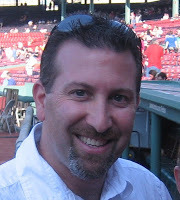
How the Hell Did I Become a Writer? by Mike Squatrito
So you have a great story, maybe even have written it, but don’t know what to do next, right? And you think you’re alone? I was in the same position, oh about twenty years ago, but since that day I started typing my first Overlords novel in 1992, I have finished and self-published three novels in my series, visited local schools and libraries, started a self-publishing consultancy, and mentor high school seniors with their literary capstone projects! OK, maybe I’m a little ambitious, but this didn’t all happen overnight.
Being an engineer by day, it took me about five years to finish the draft of my first novel. Like many of you, I got married, bought a house, had a child, switched jobs twice, got divorced, remarried … I think you get the picture! But in between all of the real life episodes I never stopped writing. I continued to learn, honed my skills, gathered a cult following, and followed the Internet’s maturation progress, being sure to try my best to stay ahead of the curve. Today, I’m on all the social networking sites, have a presence in as many circles as I can possibly be, and most of all, do my best to help others that are stuck in the same pitfalls I used to get stuck in. And, I finished and self-published the next two installments in my Overlords storyline. I’m currently working on the fourth and final (?) installment with a possible children’s Overlords book swirling around in my head.
I’m not saying it’s easy and a lot of hard work must go into making a great novel, but you can do it. Heck, if I can do it, so can you! Just remember, nothing truly happens overnight. All of those “overnight sensations” have really gone through years of pain and suffering before getting discovered. I’m still waiting to get discovered myself, but in the meantime I’m enjoying the journey, and you should too!
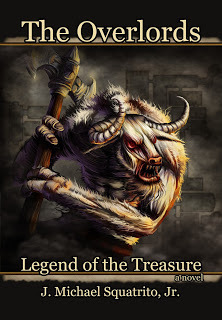 You can check out my books at www.The-Overlords.com. They read like a Lord of the Rings story, written at a Harry Potter level, with the characters influenced by the original Star Wars cast. A can’t miss audience – I know! If you visit my site, feel free to drop me a line and subscribe to my newsletter so you can see all of the cool things I’m up to, and better yet, how we can help each other. If you need help self-publishing your work, check out my self-publishing consultancy, www.SelfPublishingInsight.com.
You can check out my books at www.The-Overlords.com. They read like a Lord of the Rings story, written at a Harry Potter level, with the characters influenced by the original Star Wars cast. A can’t miss audience – I know! If you visit my site, feel free to drop me a line and subscribe to my newsletter so you can see all of the cool things I’m up to, and better yet, how we can help each other. If you need help self-publishing your work, check out my self-publishing consultancy, www.SelfPublishingInsight.com.
Never stop dreaming, never stop writing, and never, ever doubt yourself!!!

How the Hell Did I Become a Writer? by Mike Squatrito
So you have a great story, maybe even have written it, but don’t know what to do next, right? And you think you’re alone? I was in the same position, oh about twenty years ago, but since that day I started typing my first Overlords novel in 1992, I have finished and self-published three novels in my series, visited local schools and libraries, started a self-publishing consultancy, and mentor high school seniors with their literary capstone projects! OK, maybe I’m a little ambitious, but this didn’t all happen overnight.
Being an engineer by day, it took me about five years to finish the draft of my first novel. Like many of you, I got married, bought a house, had a child, switched jobs twice, got divorced, remarried … I think you get the picture! But in between all of the real life episodes I never stopped writing. I continued to learn, honed my skills, gathered a cult following, and followed the Internet’s maturation progress, being sure to try my best to stay ahead of the curve. Today, I’m on all the social networking sites, have a presence in as many circles as I can possibly be, and most of all, do my best to help others that are stuck in the same pitfalls I used to get stuck in. And, I finished and self-published the next two installments in my Overlords storyline. I’m currently working on the fourth and final (?) installment with a possible children’s Overlords book swirling around in my head.
I’m not saying it’s easy and a lot of hard work must go into making a great novel, but you can do it. Heck, if I can do it, so can you! Just remember, nothing truly happens overnight. All of those “overnight sensations” have really gone through years of pain and suffering before getting discovered. I’m still waiting to get discovered myself, but in the meantime I’m enjoying the journey, and you should too!
 You can check out my books at www.The-Overlords.com. They read like a Lord of the Rings story, written at a Harry Potter level, with the characters influenced by the original Star Wars cast. A can’t miss audience – I know! If you visit my site, feel free to drop me a line and subscribe to my newsletter so you can see all of the cool things I’m up to, and better yet, how we can help each other. If you need help self-publishing your work, check out my self-publishing consultancy, www.SelfPublishingInsight.com.
You can check out my books at www.The-Overlords.com. They read like a Lord of the Rings story, written at a Harry Potter level, with the characters influenced by the original Star Wars cast. A can’t miss audience – I know! If you visit my site, feel free to drop me a line and subscribe to my newsletter so you can see all of the cool things I’m up to, and better yet, how we can help each other. If you need help self-publishing your work, check out my self-publishing consultancy, www.SelfPublishingInsight.com. Never stop dreaming, never stop writing, and never, ever doubt yourself!!!
Published on February 07, 2013 05:00
February 6, 2013
Is Editing Really A Sick Form of Slow Suicide?
I have to admit it. There are several things I loathe in life. Beets, yellow mustard, folding clothes and editing. Oh, there are other things on the list, but I am the most passionate about these four. And the number one hate on the list is editing.
 In the beginning I sounded exactly like a new writer does. Like, how dare anyone question the utter brilliance of my words? And of course because they edit me, obviously they can't write, like in the old adage, if you can't write, teach. Or in their case, edit.
In the beginning I sounded exactly like a new writer does. Like, how dare anyone question the utter brilliance of my words? And of course because they edit me, obviously they can't write, like in the old adage, if you can't write, teach. Or in their case, edit.
 But I learned how wrong I was. Notice I didn't say I learned quickly. No campers, this was a lesson that would stick, so it would have to be painful. Those are the only lessons that affect you; the ones with pain attached. And in this case, the pain was learning I was NOT the most remarkable writer my editor had ever encountered. The editing process was not going to be the walk-in-the-park I had envisioned. In fact, it was nothing like that. It hurt. It was a soul-sucking, self-examining process and I crawled through it as though I were scuttling over broken glass on my knees.
But I learned how wrong I was. Notice I didn't say I learned quickly. No campers, this was a lesson that would stick, so it would have to be painful. Those are the only lessons that affect you; the ones with pain attached. And in this case, the pain was learning I was NOT the most remarkable writer my editor had ever encountered. The editing process was not going to be the walk-in-the-park I had envisioned. In fact, it was nothing like that. It hurt. It was a soul-sucking, self-examining process and I crawled through it as though I were scuttling over broken glass on my knees.
Okay, maybe that is a bit extreme, but I think you get the picture. The editing process doesn't just make your book/story/novel/etc. better; it makes you better. And therefore it improves everything else you write. I have written eight books and on each one I employ the same editing "suggestions" given to me on my first book. And my second, and third, and so on.
As I write now, I notice that the editing "suggestions" I was taught (and I had some amazing editors!), are now things I use almost without thinking. And I don't even use italics with them anymore. And even better, I use them when I make "suggestions" (ahem) to my indie author friends who ask my advice about the publishing world. Imagine that. Hmmm.
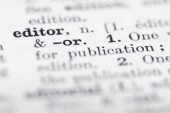 So, I hope your take-away from this little lesson is to trust your editor. This is not to say that they are somehow superhuman, or worse, less-than-human. They are. Humans, I mean. So as long as you remember to treat each other as humans, your working relationship will be symbiotic and a pleasure for all.
So, I hope your take-away from this little lesson is to trust your editor. This is not to say that they are somehow superhuman, or worse, less-than-human. They are. Humans, I mean. So as long as you remember to treat each other as humans, your working relationship will be symbiotic and a pleasure for all.
And that's important, because guess what? As humans, editors talk to other editors and the last thing you need on your impossibly gut-wrenching journey to greatness is to piss an editor off. You don't want to be known as THAT WRITER. At least not for piss-poor critique accepting. You want to be remembered for being THAT WRITER of the amazing novels. And so will your editor. Good luck.
 In the beginning I sounded exactly like a new writer does. Like, how dare anyone question the utter brilliance of my words? And of course because they edit me, obviously they can't write, like in the old adage, if you can't write, teach. Or in their case, edit.
In the beginning I sounded exactly like a new writer does. Like, how dare anyone question the utter brilliance of my words? And of course because they edit me, obviously they can't write, like in the old adage, if you can't write, teach. Or in their case, edit. But I learned how wrong I was. Notice I didn't say I learned quickly. No campers, this was a lesson that would stick, so it would have to be painful. Those are the only lessons that affect you; the ones with pain attached. And in this case, the pain was learning I was NOT the most remarkable writer my editor had ever encountered. The editing process was not going to be the walk-in-the-park I had envisioned. In fact, it was nothing like that. It hurt. It was a soul-sucking, self-examining process and I crawled through it as though I were scuttling over broken glass on my knees.
But I learned how wrong I was. Notice I didn't say I learned quickly. No campers, this was a lesson that would stick, so it would have to be painful. Those are the only lessons that affect you; the ones with pain attached. And in this case, the pain was learning I was NOT the most remarkable writer my editor had ever encountered. The editing process was not going to be the walk-in-the-park I had envisioned. In fact, it was nothing like that. It hurt. It was a soul-sucking, self-examining process and I crawled through it as though I were scuttling over broken glass on my knees.Okay, maybe that is a bit extreme, but I think you get the picture. The editing process doesn't just make your book/story/novel/etc. better; it makes you better. And therefore it improves everything else you write. I have written eight books and on each one I employ the same editing "suggestions" given to me on my first book. And my second, and third, and so on.
As I write now, I notice that the editing "suggestions" I was taught (and I had some amazing editors!), are now things I use almost without thinking. And I don't even use italics with them anymore. And even better, I use them when I make "suggestions" (ahem) to my indie author friends who ask my advice about the publishing world. Imagine that. Hmmm.
 So, I hope your take-away from this little lesson is to trust your editor. This is not to say that they are somehow superhuman, or worse, less-than-human. They are. Humans, I mean. So as long as you remember to treat each other as humans, your working relationship will be symbiotic and a pleasure for all.
So, I hope your take-away from this little lesson is to trust your editor. This is not to say that they are somehow superhuman, or worse, less-than-human. They are. Humans, I mean. So as long as you remember to treat each other as humans, your working relationship will be symbiotic and a pleasure for all.And that's important, because guess what? As humans, editors talk to other editors and the last thing you need on your impossibly gut-wrenching journey to greatness is to piss an editor off. You don't want to be known as THAT WRITER. At least not for piss-poor critique accepting. You want to be remembered for being THAT WRITER of the amazing novels. And so will your editor. Good luck.
Published on February 06, 2013 05:00
Is Self-Editing Really A Sick Form of Slow Suicide?
I have to admit it. There are several things I loathe in life. Beets, yellow mustard, folding clothes and editing. Oh, there are other things on the list, but I am the most passionate about these four. And the number one hate on the list is editing.
 In the beginning I sounded exactly like a new writer does. Like, how dare anyone question the utter brilliance of my words? And of course because they edit me, obviously they can't write, like in the old adage, if you can't write, teach. Or in their case, edit.
In the beginning I sounded exactly like a new writer does. Like, how dare anyone question the utter brilliance of my words? And of course because they edit me, obviously they can't write, like in the old adage, if you can't write, teach. Or in their case, edit.
 But I learned how wrong I was. Notice I didn't say I learned quickly. No campers, this was a lesson that would stick, so it would have to be painful. Those are the only lessons that affect you; the ones with pain attached. And in this case, the pain was learning I was NOT the most remarkable writer my editor had ever encountered. The editing process was not going to be the walk-in-the-park I had envisioned. In fact, it was nothing like that. It hurt. It was a soul-sucking, self-examining process and I crawled through it as though I were scuttling over broken glass on my knees.
But I learned how wrong I was. Notice I didn't say I learned quickly. No campers, this was a lesson that would stick, so it would have to be painful. Those are the only lessons that affect you; the ones with pain attached. And in this case, the pain was learning I was NOT the most remarkable writer my editor had ever encountered. The editing process was not going to be the walk-in-the-park I had envisioned. In fact, it was nothing like that. It hurt. It was a soul-sucking, self-examining process and I crawled through it as though I were scuttling over broken glass on my knees.
Okay, maybe that is a bit extreme, but I think you get the picture. The editing process doesn't just make your book/story/novel/etc. better; it makes you better. And therefore it improves everything else you write. I have written eight books and on each one I employ the same editing "suggestions" given to me on my first book. And my second, and third, and so on.
As I write now, I notice that the editing "suggestions" I was taught (and I had some amazing editors!), are now things I use almost without thinking. And I don't even use italics with them anymore. And even better, I use them when I make "suggestions" (ahem) to my indie author friends who ask my advice about the publishing world. Imagine that. Hmmm.
 So, I hope your take-away from this little lesson is to trust your editor. This is not to say that they are somehow superhuman, or worse, less-than-human. They are. Humans, I mean. So as long as you remember to treat each other as humans, your working relationship will be symbiotic and a pleasure for all.
So, I hope your take-away from this little lesson is to trust your editor. This is not to say that they are somehow superhuman, or worse, less-than-human. They are. Humans, I mean. So as long as you remember to treat each other as humans, your working relationship will be symbiotic and a pleasure for all.
And that's important, because guess what? As humans, editors talk to other editors and the last thing you need on your impossibly gut-wrenching journey to greatness is to piss an editor off. You don't want to be known as THAT WRITER. At least not for piss-poor critique accepting. You want to be remembered for being THAT WRITER of the amazing novels. And so will your editor. Good luck.
 In the beginning I sounded exactly like a new writer does. Like, how dare anyone question the utter brilliance of my words? And of course because they edit me, obviously they can't write, like in the old adage, if you can't write, teach. Or in their case, edit.
In the beginning I sounded exactly like a new writer does. Like, how dare anyone question the utter brilliance of my words? And of course because they edit me, obviously they can't write, like in the old adage, if you can't write, teach. Or in their case, edit. But I learned how wrong I was. Notice I didn't say I learned quickly. No campers, this was a lesson that would stick, so it would have to be painful. Those are the only lessons that affect you; the ones with pain attached. And in this case, the pain was learning I was NOT the most remarkable writer my editor had ever encountered. The editing process was not going to be the walk-in-the-park I had envisioned. In fact, it was nothing like that. It hurt. It was a soul-sucking, self-examining process and I crawled through it as though I were scuttling over broken glass on my knees.
But I learned how wrong I was. Notice I didn't say I learned quickly. No campers, this was a lesson that would stick, so it would have to be painful. Those are the only lessons that affect you; the ones with pain attached. And in this case, the pain was learning I was NOT the most remarkable writer my editor had ever encountered. The editing process was not going to be the walk-in-the-park I had envisioned. In fact, it was nothing like that. It hurt. It was a soul-sucking, self-examining process and I crawled through it as though I were scuttling over broken glass on my knees.Okay, maybe that is a bit extreme, but I think you get the picture. The editing process doesn't just make your book/story/novel/etc. better; it makes you better. And therefore it improves everything else you write. I have written eight books and on each one I employ the same editing "suggestions" given to me on my first book. And my second, and third, and so on.
As I write now, I notice that the editing "suggestions" I was taught (and I had some amazing editors!), are now things I use almost without thinking. And I don't even use italics with them anymore. And even better, I use them when I make "suggestions" (ahem) to my indie author friends who ask my advice about the publishing world. Imagine that. Hmmm.
 So, I hope your take-away from this little lesson is to trust your editor. This is not to say that they are somehow superhuman, or worse, less-than-human. They are. Humans, I mean. So as long as you remember to treat each other as humans, your working relationship will be symbiotic and a pleasure for all.
So, I hope your take-away from this little lesson is to trust your editor. This is not to say that they are somehow superhuman, or worse, less-than-human. They are. Humans, I mean. So as long as you remember to treat each other as humans, your working relationship will be symbiotic and a pleasure for all.And that's important, because guess what? As humans, editors talk to other editors and the last thing you need on your impossibly gut-wrenching journey to greatness is to piss an editor off. You don't want to be known as THAT WRITER. At least not for piss-poor critique accepting. You want to be remembered for being THAT WRITER of the amazing novels. And so will your editor. Good luck.
Published on February 06, 2013 05:00
February 5, 2013
A New Release for Annamaria Bazzi
A new facebook friend, Annamaria Bazzi, is very excited about her new release and I am happy to help her make the announcement. Two more days! Check her out!
Book Release Announcement
Book Title : Revelation of AbaddonAuthor : annamaria bazziGenre : Paranormal RomanceExpected Release Date : February 8, 2013Photographer : Owen DeValkCover Designer : Amanda Bazzi
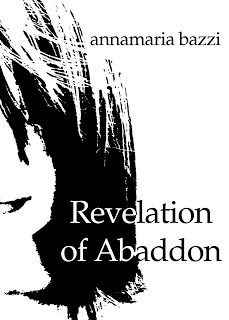
Book Blurb :
Freelance programmer, Mia notices two men moving into the house across the street. She’s immediately attracted to Andrew. Handsome and charming, he sweeps her off her feet—yet there’s something else about him, too. Whenever she’s close to him, her mind and body crave pain. Confusion overwhelms her senses. Will falling in love with such a strange man be worth it?
About the Author :
Although born in the United States, Annamaria Bazzi spent a great deal of her childhood in Sicily, Italy, in a town called Sciacca. Italian was the language spoken at home. Therefore, she had no problems when she found herself growing up in a strange country.Upon returning to the states, she promised herself she would speak without an accent.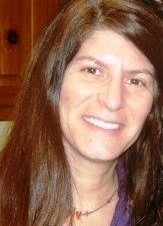
She attended Wayne State University in Detroit Michigan, where she obtained her Bachelor of Science in Computers with a minor in Spanish.Annamaria spent twenty years programming systems for large corporations, creating innovative solution, and addressing customer problems. During those years, she raised four daughters and one husband. Annamaria lives in Richmond Virginia with her small family where she now dedicates a good part of her day writing.
You can visit Annamaria at:Facebook : https://www.facebook.com/Author.annamariabazziBlog : http://www.annamariabazzi.comTwitter : @AMBazziBook Links : http://www.amazon.com/gp/product/B00APCB9N0?ie=UTF8&camp=1789&creativeASIN=B00APCB9N0&linkCode=xm2&tag=annascorn02-20
Book Release Announcement
Book Title : Revelation of AbaddonAuthor : annamaria bazziGenre : Paranormal RomanceExpected Release Date : February 8, 2013Photographer : Owen DeValkCover Designer : Amanda Bazzi

Book Blurb :
Freelance programmer, Mia notices two men moving into the house across the street. She’s immediately attracted to Andrew. Handsome and charming, he sweeps her off her feet—yet there’s something else about him, too. Whenever she’s close to him, her mind and body crave pain. Confusion overwhelms her senses. Will falling in love with such a strange man be worth it?
About the Author :
Although born in the United States, Annamaria Bazzi spent a great deal of her childhood in Sicily, Italy, in a town called Sciacca. Italian was the language spoken at home. Therefore, she had no problems when she found herself growing up in a strange country.Upon returning to the states, she promised herself she would speak without an accent.

She attended Wayne State University in Detroit Michigan, where she obtained her Bachelor of Science in Computers with a minor in Spanish.Annamaria spent twenty years programming systems for large corporations, creating innovative solution, and addressing customer problems. During those years, she raised four daughters and one husband. Annamaria lives in Richmond Virginia with her small family where she now dedicates a good part of her day writing.
You can visit Annamaria at:Facebook : https://www.facebook.com/Author.annamariabazziBlog : http://www.annamariabazzi.comTwitter : @AMBazziBook Links : http://www.amazon.com/gp/product/B00APCB9N0?ie=UTF8&camp=1789&creativeASIN=B00APCB9N0&linkCode=xm2&tag=annascorn02-20
Published on February 05, 2013 21:27



